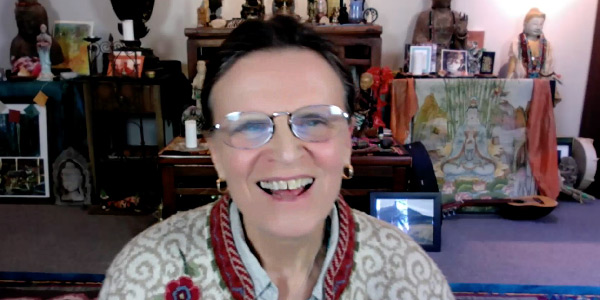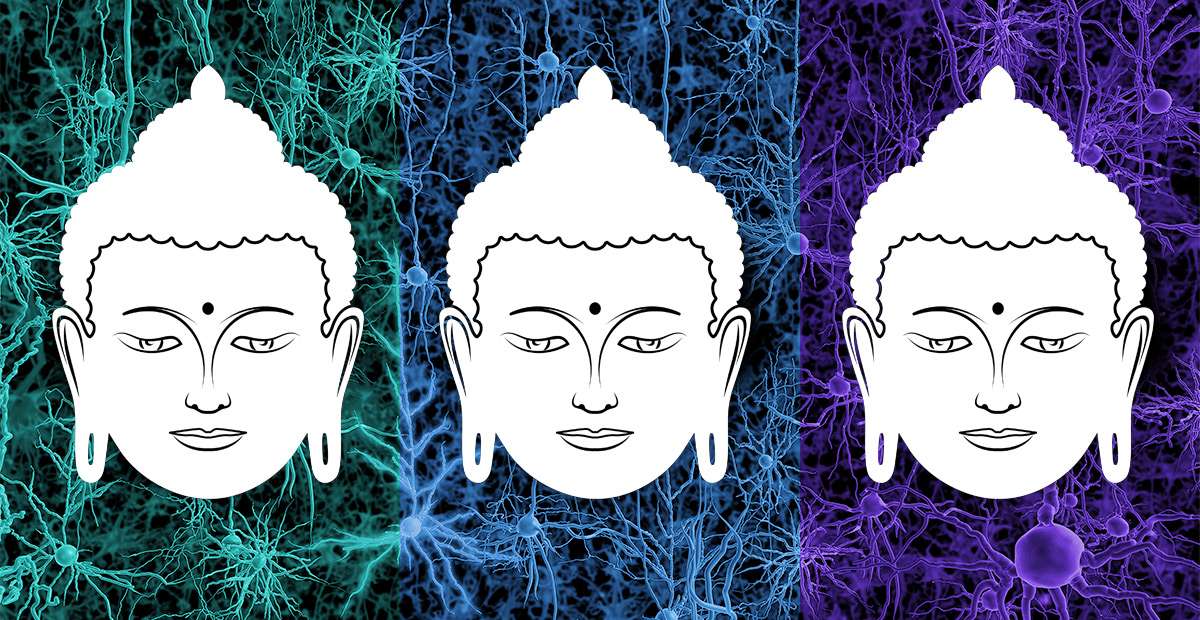by Nalanda Institute
If you’re curious to learn more about the types of conversations we’re holding within our Certificate Programs, check out this lecture from our Certificate Program in Embodied Wisdom where Thanissara discusses the feminine as essential to our awakening. Thanissara, MA in Mindfulness-Based Psychotherapy, is a Climate Activist, author, co-founder of Dharmagiri Sacred Mountain Retreat, Buddhist teacher, and visiting faculty of our Certificate Program in Embodied Wisdom.
This video is a snapshot of a class in progress, where Thanissara applies the Dharma to our times of planetary emergency. She comments on what has led to our current collective consciousness, which she describes as being divorced from a deep sense of belonging. Thanissara invites us to look more deeply into our understanding of the world, and reflect on the internal and external narratives that define who we are both individually and collectively. She discusses how the dharma has the capacity to illuminate the potential of the medicine of awareness, investigation, inquiry and freedom, to explore and make conscious choices. Thanissara also dives into the importance of reclaiming the feminine in support of our liberation. She describes the feminine as a nondualistic, formless, intuitive awareness which allows us to move beyond the cognitive into a place of embodied feeling. This place of embodied feeling takes us away from an objectification of the other, and toward a stance of interconnection—which is critical at this planetary moment in time.
Our Certificate Program in Embodied Wisdom starts this Fall 2024! Learn more + apply now.
Learn more about our other Certificate Programs starting Fall 2024:
Certificate Program in Wise Compassion
Programa de Certificación en Sabiduría Encarnada
Programa de Certificação em Sabedoria Corporificada
Learn more about our Contemplative Psychotherapy Program:
Contemplative Psychotherapy Program Overview
by Nalanda Institute
Nalanda Institute’s Certificate Program in Embodied Wisdom brings together the embodied transformational psychology of the Tibetan Tantras with current neuropsychology, psychotherapy, and psychosocial change to bring a holistic approach to healing trauma and fostering personal and communal well-being. Curious to learn more?
Check out this short video, where Chantelle Brown, MSW, LMSW, and Co-Director of our Certificate Program in Embodied Wisdom, shares her perspective on what this program offers participants and how it impacts our individual and collective awakening. Chantelle discusses how the program offers a pathway to navigate this time of immense global change, while also inviting us to discover “who we are” within our current modern-day context. Chantelle explores how our lineages (including experiences of colonization, immigration, and migration) affect our identities and how we must make loving contact with our unique lived experiences and narratives before we can move toward true liberation.
The Certificate Program in Embodied Wisdom offers a space to come into conversation with our personal stories and identities framed within the social and cultural contexts that affect us individually and collectively.
Learn more about our Certificate Program in Embodied Wisdom
Learn more about our other Certificate Programs being offered in Fall 2024:
Certificate Program in Wise Compassion
Programa de Certificación en Sabiduría Encarnada
Programa de Certificação em Sabedoria Corporificada
Contemplative Psychotherapy Program Overview
by Nalanda Institute

Summertime offers us longer days, warm breezes, and a natural invitation for more play, a slower pace, and joyful activities. It’s a magical time when lush foliage and blooming flowers invite us to depart from our regular routines and create new rituals that evoke a sense of expansion and connection.
Our Summer Reading List, an annual Nalanda Institute tradition, is a compilation of book recommendations thoughtfully shared by members of the Nalanda Institute community. The intention of this list is to help support a sense of wonder, ease, and connection through the joy of reading. We have some great recommendations that will no doubt spawn introspection, wisdom, practice, healing, embodied awareness, contemplation, activism, and awe!
We hope you find a book or two that can accompany you over the next few months. Happy Summer!
We are an affiliate of Bookshop.org and will earn a small commission if you click through and make a purchase.
by Nalanda Institute
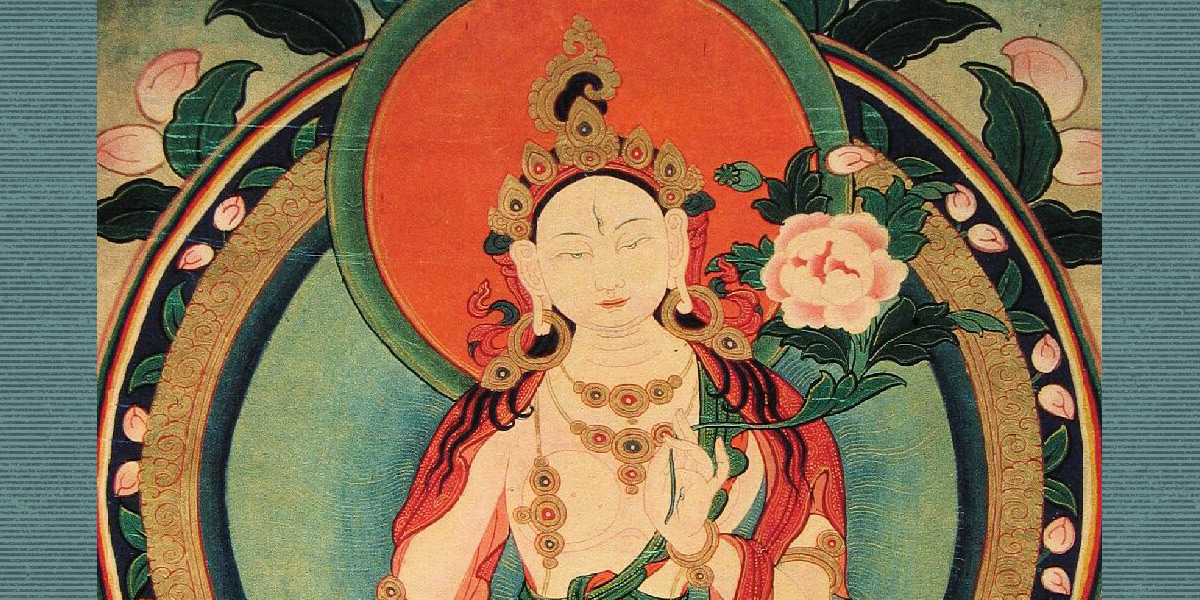
This meditation is from our Fall 2023 Certificate Course in Wise Compassion, led by Pilar Jennings, PhD, author, psychoanalyst and one of Nalanda Institute’s core teaching faculty across our Certificate Courses within our Contemplative Psychotherapy Program—including our Fall 2024 Certificate Course offerings.
In this meditation, Pilar offers guidance on how to settle into the body and lean into the practice of becoming more attuned to and aware of our own suffering, as well as the suffering of others. Pilar then invites us to apply tenderness to the suffering. Both meditating on awareness, and cultivating tenderness, can help us to lay the foundation for personal and social healing.
Enjoy!
En este audio, Pilar Jennings nos ofrece orientación sobre cómo asentarnos en el cuerpo y dedicarnos a la práctica de estar más en sintonía y ser más conscientes de nuestro propio sufrimiento, así como del sufrimiento de los demás. A continuación, aplicamos ternura. Meditar sobre la conciencia y cultivar la ternura puede ayudarnos a sentar las bases de una curación personal y social.
Meditación traducida por C. Gutiérrez
Neste áudio, Pilar Jennings oferece orientação sobre como se acomodar no corpo e se dedicar à prática de nos tornarmos mais sintonizados e conscientes de nosso próprio sofrimento, bem como do sofrimento dos outros. Em seguida, aplicamos ternura. Meditar sobre a consciência e cultivar a ternura pode nos ajudar a estabelecer as bases para a cura pessoal e social!
Meditação traduzida por I. Zenteno
Find out more about Nalanda Institute’s Contemplative Psychotherapy Certificate Courses starting Fall 2024:
Contemplative Psychotherapy Program Overview
Certificate Program in Wise Compassion
Certificate Program in Embodied Wisdom
Programa de Certificación en Sabiduría Encarnada
Programa de Certificação em Sabedoria Corporificada
by Nalanda Institute
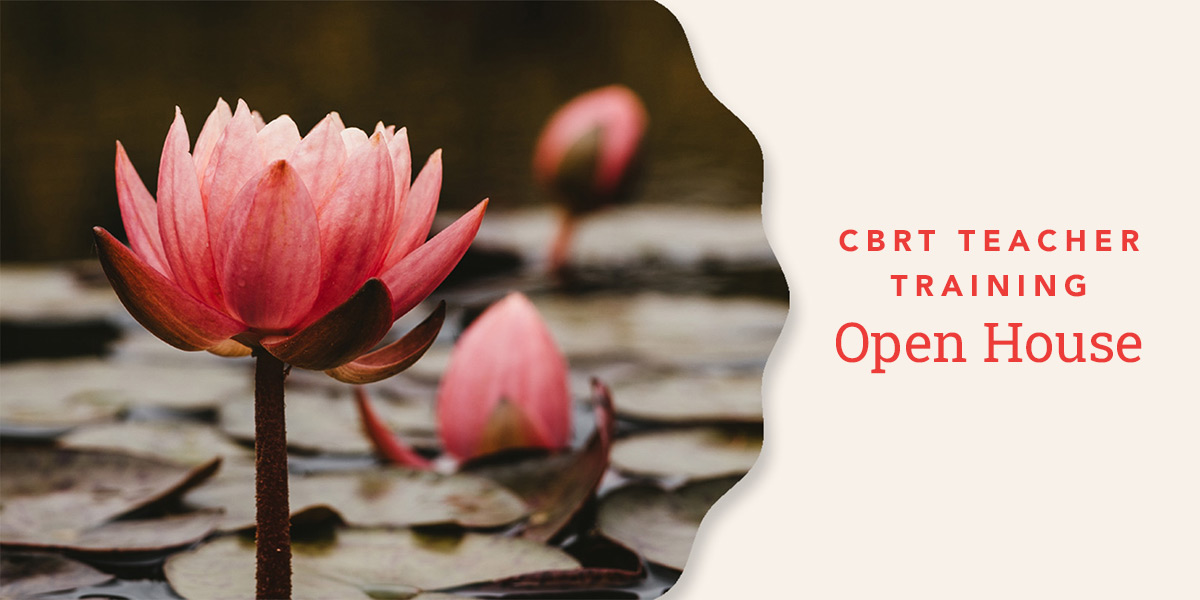
CBRT Teacher Training is an exciting opportunity to learn how to teach Compassion-Based Resilience Training (CBRT), an evidence-based program developed and field-tested over 20 years to support stress reduction, resilience and self-healing. If you’re curious to learn more about the training, check out this video—a recording from our Open House, where core faculty discussed the program and answered potential student’s questions.
CBRT has a unique, multifaceted approach that brings together mindfulness, compassion, contemplative healing, and embodied practices all into one program. Meditation and mindfulness are known to counteract emotional stress reactivity and worst-case thinking, while also supporting the development of positive emotions and an unbiased open mind. Research has also shown cross-training mindfulness with compassion practices actually increases its efficacy.
Furthermore, the CBRT approach is distinctive from other programs through its integration of embodied practices into its curriculum—which catalyzes the path to self-healing through its effect on the nervous system, including shifting the nervous system into bonding and play mode, calming the vagus nerve, supporting the brain’s higher social capacities, speeding the natural development of compassion, sending cues of safe connection from body to brain, and rewiring our stress-reactive autonomic system into a network of unshakable, blissful connectedness and well-being.
The CBRT Teacher Training cohorts are international and diverse, with participants coming from all over the globe and from a multitude of disciplines (including mental health, coaching, yoga, medicine, humanitarian aid, and community health). This dynamic and diverse community provides a supportive, motivating, and validating environment for connection and learning.
If you’re interested in learning how to integrate contemplative practice into your life and work and how to deliver Compassion-Based Resilience Training to groups both large and small, whether in healthcare, education, business, or community service settings—this program is for you! Join Nalanda Institute founder and creator of CBRT, Joe Loizzo, MD, PhD, meditation teacher and Contemplative Therapist Moustafa Abdelrahman, MBA, RP, and Nalanda Institute’s Director of CBRT, Fiona Brandon, MPS, MA, MFT, on this transformative journey starting soon!
Find out more about Nalanda Institute’s CBRT Teacher Training.
by Katherine Jamieson

Editor’s Note: Katherine Jamieson will be leading a 3-session contemplative writing course, Contemplative Writing: Uncovering the Writer Within beginning May 7th. Find out more and register today.
I talk to a lot of people who want to be writers, but are struggling. Something is in the way. They think: What should I write about? Am I good enough to even be doing this? Who would want to read my work? They sit down to create and 10,000 distractions rise up: text messages, appointments, pressing errands. Soon they are doing something else, something urgent, which is actually a relief. Anything is easier than writing.
The act of writing is very simple: just put one word after another. But this simplicity is also anxiety-provoking. There is no hiding behind an instrument, tools or fancy technology. All you have is a pen or pencil, maybe a computer. Writing is a very exposed art. You are sharing your thoughts on the page, laying your mind bare for all to see. You are offering your view on what it means to be alive. What could be more amazing, or more terrifying?
Often when I sit down to write my mind is going in many directions at once. My thoughts and emotions are jumbled, loud, vying for attention. But if I can remember to breathe and feel my fingers on the smooth keyboard, my body in the chair, I can ease into what I am doing. Maybe I need to start slowly. For the next five minutes, I am writing. And then tomorrow: For the next twenty minutes… This is how we build muscle and cultivate our writing practice, our writing life.
Over time we can begin to tap into our natural stillness. If we allow this quiet to grow it will nourish us and give us the courage to push back against our self-judgment, hyper-criticism, and censoring mind. It will help us heighten our awareness and powers of observation. We may tap into long-forgotten memories and feelings, make sense of our past, vision our future, bring rough beauty into the world.
Fundamentally, we must learn to trust ourselves. In the words of John Daido Loori, former Abbott of Zen Mountain Monastery:
“If I was asked to get rid of the Zen aesthetic and just keep one quality necessary to create art, I would say it’s trust. When you learn to trust yourself implicitly, you no longer need to prove something through your art. You simply allow it to come out, to be as it is. This is when creating art becomes effortless. It happens just as you grow your hair. It grows.”
When we trust ourselves all the myriad writing struggles and doubts start to fade away. We see that our creative self is the same as our day-to-day self, not something special or separate. The rewards of writing begin to outweigh the risks, our fear recedes, and we see our vast potential, as wide and bright as the ocean on a full moon night. Effortlessness is the natural outgrowth of trusting ourselves, not just a pie-in-the-sky idea but a way of being in the world.
Most importantly, when we trust ourselves we’re able to be joyful as we create, regardless of the outcome. We know that we are worthy, and we can relax into this knowledge. Writing now brings us relief, not tension. As Loori says, we release ourselves from the idea of having to prove something through our art.
We write to write, just that.
This post originally appeared in Medium. Find out more about visiting faculty Katherine Jamieson (bio). See also katherinejamieson.com
Photo by Faye Cornish (unsplash.com)
by Nalanda Institute
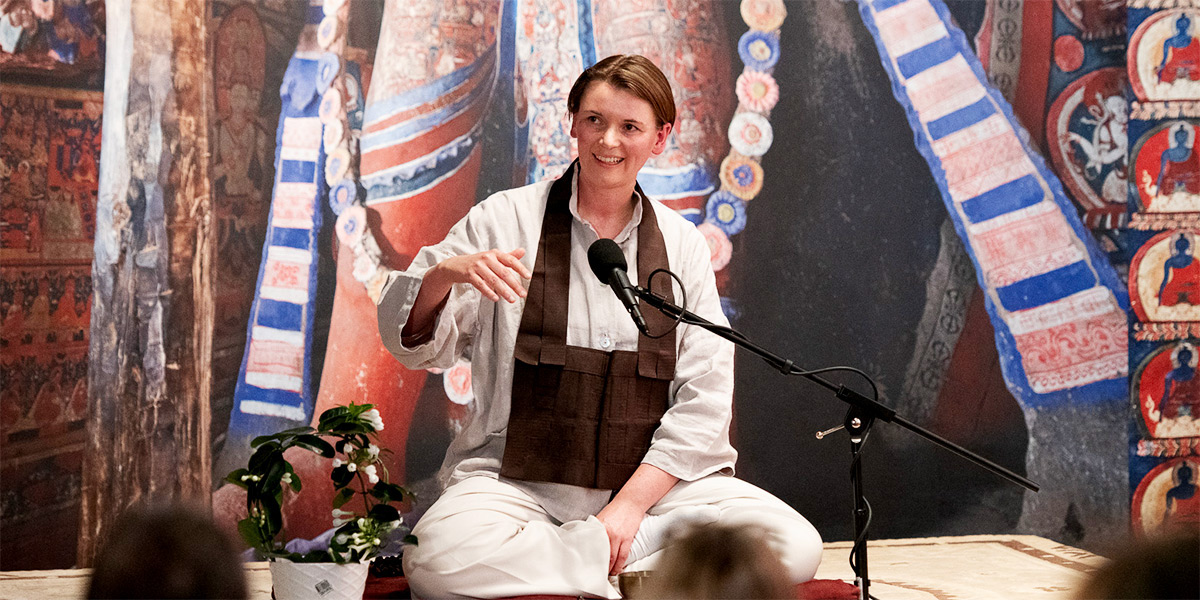
In January, Nalanda Institute, in collaboration with Wonderstruck, hosted Tatsudo Nicole Baden Roshi at Tibet House US, who gave a dharma talk and meditation on the foundational Buddhist principle of Śūnyatā, or emptiness.
According to Roshi, emptiness is one of the hardest concepts in Buddhism to get a real feeling for—because the way many of us perceive this word is conceptually vastly different from the phenomena it’s meant to represent within Buddhism. Roshi’s talk provides a framework and entry point to begin to unpack and explore the depth of the meaning of this Buddhist concept. She not only explains the philosophical meaning of emptiness—which is rooted in developing an awareness of the interconnected experience of our reality—but also discusses the experiential component of emptiness and how senses, awareness, and aliveness of our physical body are the entry points into being able to taste this profound and important teaching.
The video below is an edited version of the dharma talk Roshi delivered that night. We hope this offering supports your journey of touching into this transformative Buddhist principle of Śūnyatā.
by Geri Loizzo
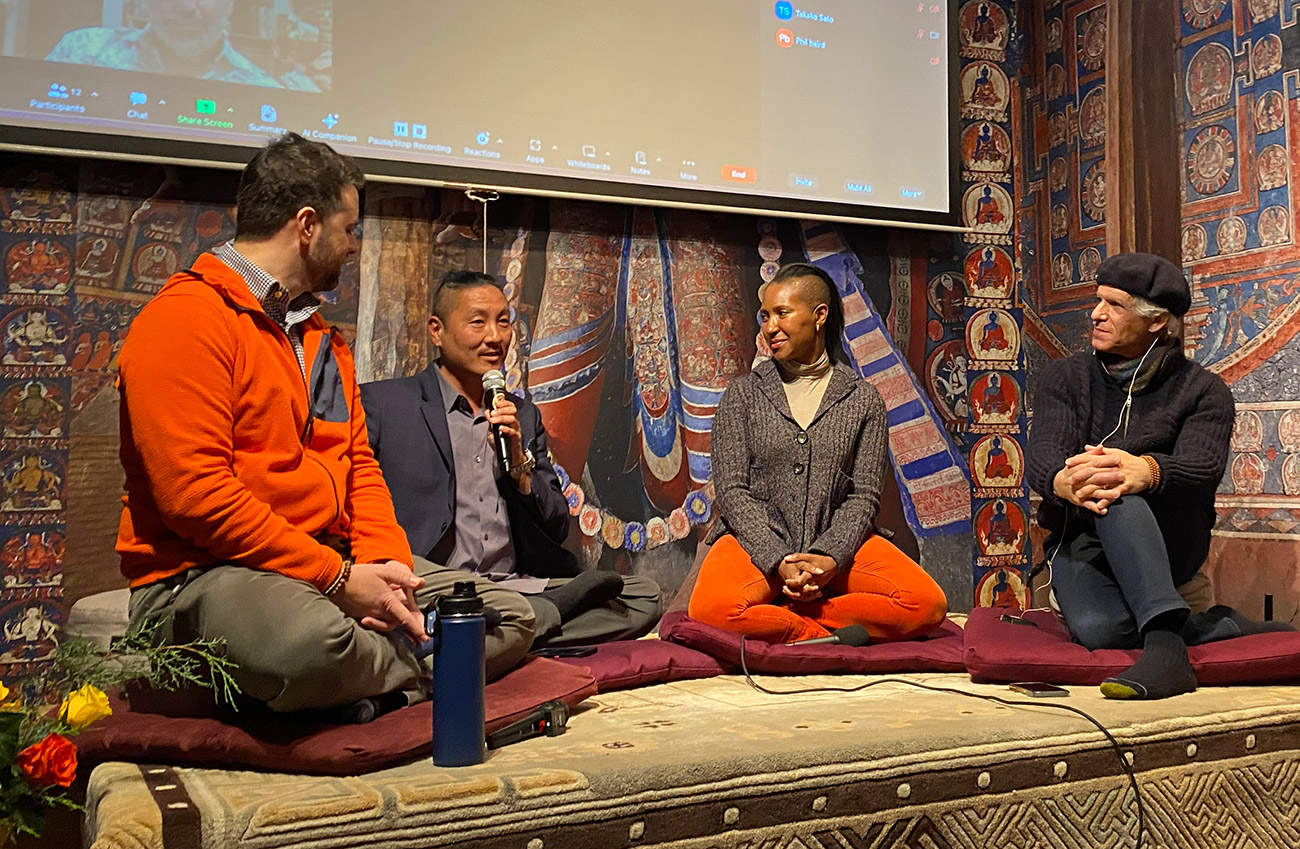
On the evening of the Solstice, as we approached the closing of 2023, the Nalanda community gathered to support our Year-End Drive and its theme, Awakening Our Shared Humanity. We are profoundly grateful to all of the participants and supporters at every level — the bodhisattvas, yogis, knowledge holders, daikinis, and world protectors!
Held in the beauty of the Tibet House temple art of Achi, amongst the sweet sounds of Bansuri flute by Sunder Das, and nourishing food and flowers — our panelists shared their rich experiences and vision on How Nalanda Institute Nurtures a More Humane Future.
Take a look and listen in to the vibrant panel discussion with author, contemplative healer, and yoga therapist Dr. James Bae, Nalanda Institute’s Director of Equity and Contemplative Psychotherapy Program Director, Rahshaana Green, and contemplative psychotherapist Dr. Michael Sosa. This insightful and vibrant panel discussion was moderated by Nalanda Institute’s founder and academic director, Dr. Joe Loizzo.
We hope that this offering will support you in making this wood dragon year, 2024, a year of wise compassion and shared humanity.
by Nalanda Institute
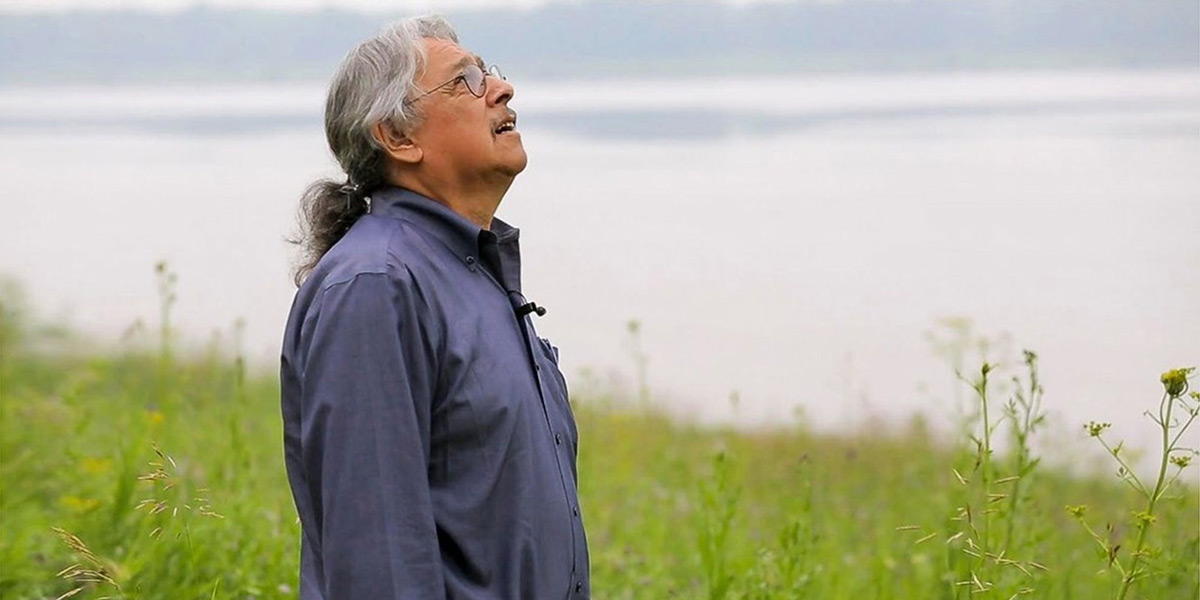
In honor of National Native American Heritage Month, we offer you this impactful teaching from the late Anishinaabe Elder Dr. Dave Courchene—our guest during our 11th online Offerings for Uncertain Times. Elder Courchene was an esteemed and internationally-known teacher, who shared his vision for the care of Mother Earth and all of her children—a vision resonant with the Tibetan Buddhist Kalachakra prophecy of the earth as a Medicine Planet. He founded the Turtle Lodge Centre of Excellence in Indigenous Education and Wellness in southern Manitoba as a gathering place to exchange intergenerational knowledge, revitalize language, train youth leaders, and find environmental solutions to climate change.
We hope this video provides inspiration and hope to see each other, Mother Earth, our friends and foes alike, as kin—spiritually connected to each other in this great web of life.
We are living in an unprecedented time. As humanity, we continue to struggle in finding our true identity.
After much reflection in witnessing what is happening in our world, it has become quite clear that humanity is suffering from the mindset of domination that originated from the idea that we can control and dominate nature.
The land is the foundation of life and must be treated with absolute respect. To do anything else, we harm not only the earth but ourselves. The role of our dilemma, which has created symptoms, such as climate change, violence, mental illness, and racism, is a severing of our relationship with our source of life, the earth.
When we lose touch with the earth, we lose our connection to our true spiritual identity and a true understanding of our uniqueness, our purpose of humanity, our original instructions in our duties and responsibilities.
When we go to the root, our solutions lie in reestablishing our sacred connection and relationship with the earth.
Our health and well-being as human beings is directly connected to the health and well-being of Mother Earth.
We have made the land sick. How we conduct ourselves in relationship to the land and to other members of creation directly affects the balance of life.
What we do to the land, we do to ourselves; the earth operates on the principle of balance. If we comply with these natural laws, we can restore the balance of our source of life.
— Elder Dr. Dave Courchene, “Envisioning the Medicine Planet”
by Ayesha Basi

Last week, I participated in my first silent retreat led by the wonderful Kate Johnson. Not only was it my first retreat, but it was my first time spending five days in meditation focused solely on metta, the practice of lovingkindness. Metta is a practice of cultivating unconditional love, kindness, and positive energy towards oneself, others, and the world at large.
(more…)by Joe Loizzo
As you consider whether our program may be right for you, I thought it might help if I share some of the feedback I’ve heard over the years on what makes this program such a transformative journey for people seeking a deeper experience of the confluence of Buddhist contemplative psychology and contemporary life.
We offer a rare integration of rigorous academic learning, deep grounding in contemplative practice, and a learning community of open-hearted sharing led by a world-class faculty of scholar-teachers, scientific researchers, and pioneering clinicians who help make our journey together a truly life-changing experience. (more…)

